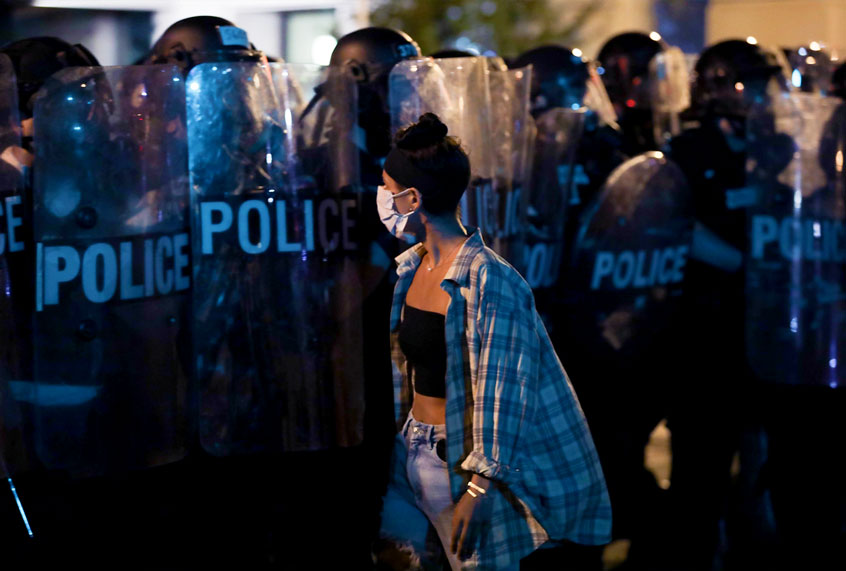A veto-proof majority of the Minneapolis City Council announced Sunday that it intends to defund and dissolve the city’s police department following the death of George Floyd in officer custody.
“We are committed to dismantling policing as we know it in the city of Minneapolis and to rebuild with our community a new model of public safety that actually keeps our community safe,” Council President Lisa Bender told CNN.
Nine of the group’s 13 members publicly committed to the move at a community rally, saying the current system was broken and would not change without radical action. They plan to dissolve the department over time through the budget process.
“It is clear that our system of policing is not keeping our communities safe,” Bender told local affiliate Fox 9. “Our efforts at incremental reform have failed — period.”
She added that people in positions of power must listen to the community, “especially to our black leaders, to our communities of color, for whom policing is not working and to really let the solutions lie in our community.”
The move was a break with Minneapolis Mayor Jacob Frey, who was booed out of a rally Saturday when he would not commit to defunding the force.
In a statement after the rally, Frey said: “I’ll work relentlessly with Chief Arradondo and alongside community toward deep, structural reform and addressing systemic racism in police culture. And we’re ready to dig in and enact more community-led, public safety strategies on behalf of our city. But I do not support abolishing the Minneapolis Police Department.”
“The idea of having no police department is certainly not in the short term,” Bender said, who explained the council intends to shift public safety responsibilities to community-based programs over time.
Local news station Fox 9 reports that changes to the department would likely require a public vote to change the city charter. The charter puts the council in charge of funding the department, but it also mandates that the city maintain a minimum force, the size of which depends on population. The force currently numbers about 723 officers, while the budget affords 888.
The charter gives the mayor’s office “complete power” over the department, so any changes would require either unanimous approval from the entire city council and the mayor — or a public vote on an amendment.
A long-running underground movement, the call to abolish police has become a national rallying cry in the wake of a protest movement against police violence which swept the nation after Floyd’s death in Minneapolis police custody.
After Washington Mayor Muriel Bowser ordered “Black Lives Matter” painted in giant yellow block letters on a city street last week, Black Lives Matter D.C. tweeted, “This is a performative distraction from real policy changes. Bowser has consistently been on the wrong side of BLMDC history. This is to appease white liberals while ignoring our demands. Black Lives Matter means defund the police.”
“When we talk about defunding the police, what we’re saying is, invest in the resources that our communities need,” Black Lives Matter co-founder Alicia Garza said on “Meet the Press” Sunday on NBC News.
“So much of policing right now is generated and directed towards quality-of-life issues,” she continued. “What we do need is increased funding for housing. We need increased funding for education. We need increased funding for the quality of life of communities who are over-policed and over-surveilled.”
City leaders around the country have signaled their willingness to engage the movement.
Los Angeles Mayor Eric Garcetti pledged to cut as much as $150 million from a planned increase in the police budget, and New York Mayor Bill de Blasio said he would shift funding from the police department to youth development programs and social services. The mayor and the school superintendent of Portland have agreed to take police officers out of schools — a $1 million-budget program — and put that money into community programs.
Though the conversation long is overdue for some Americans, not all are in agreement.
Washington Police Chief Peter Newsham warned that defunding departments might actually lead to an increase in police brutality.
“If you underfund a police agency, it impacts training, it impacts hiring, it impacts your ability to develop good leaders,” Newsham told WAMU’s Kojo Nnamdi last week.
Housing and Urban Development Secretary Ben Carson, the only black member of President Donald Trump’s Cabinet, pushed back hard against the idea during a Sunday appearance on CNN’s State of the Union, telling host Jake Tapper to “think about the consequences.”
“Everybody goes out and arms themselves. They start hiring vigilante groups to protect them,” Carson said. “We have total chaos going on. You know, that makes absolutely no sense.”
The movement has also caught Trump’s ear, who tweeted his opposition last week.
“I want more money for Law Enforcement!” he wrote.
Christy E. Lopez, professor at Georgetown Law and co-director of the school’s Innovative Policing Program, writes in The Washington Post that for most activists, defunding the police does not mean removing police overnight, “or perhaps ever.”
“The ‘abolition’ language is important because it reminds us that policing has been the primary vehicle for using violence to perpetuate the unjustified white control over the bodies and lives of black people that has been with us since slavery,” she writes. “That aspect of policing must be literally abolished.”


